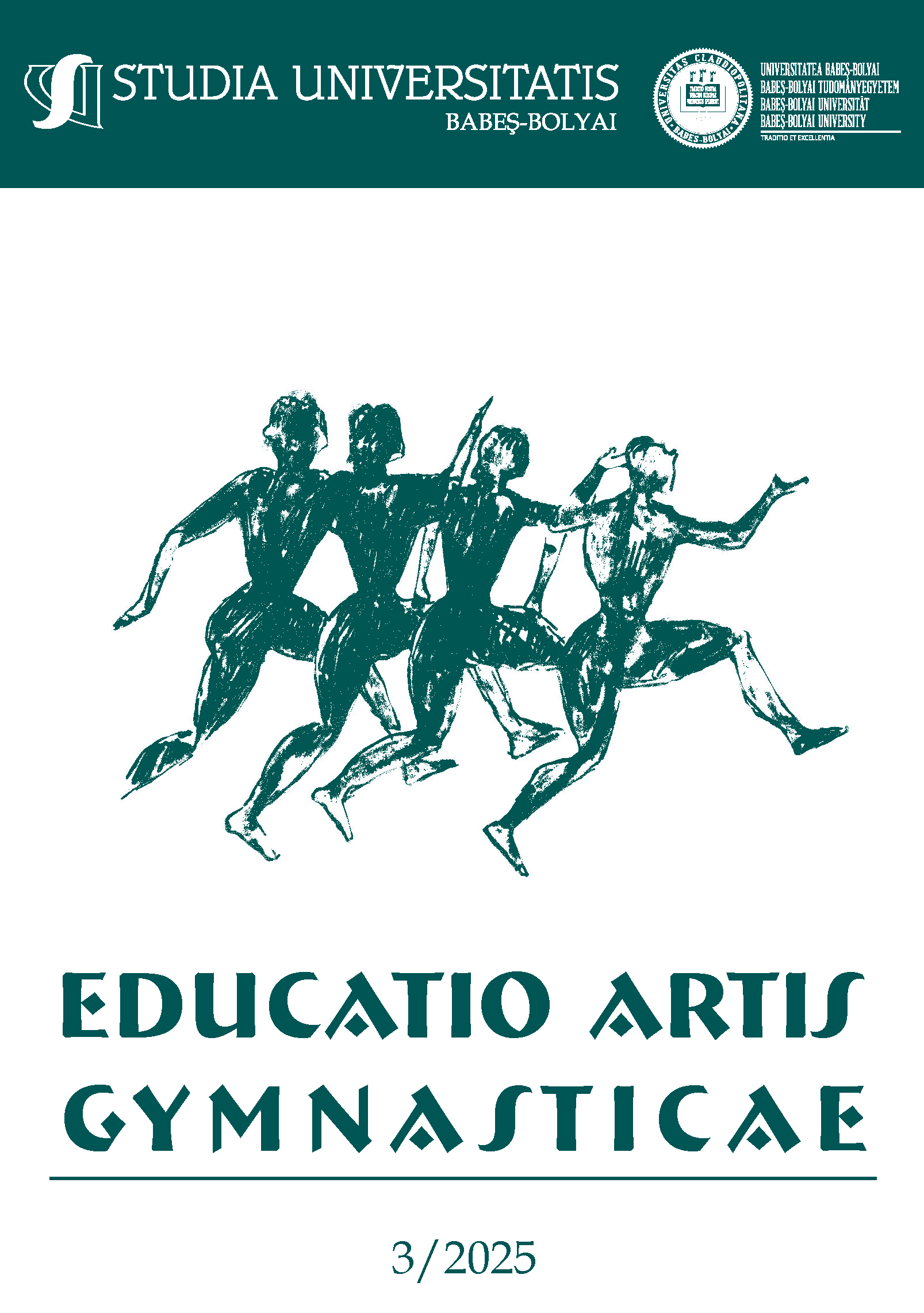Leadership in Sport: from Coach to Manager – An Integrative Perspective
DOI:
https://doi.org/10.24193/subbeag.70(3).20Keywords:
sports leadership, coach, sports manager, leadership styles, team, performanceAbstract
The evolution of leadership roles in sport has generated increasing interest in recent years, especially in the context of professionalization, performance management, and organizational complexity. This theoretical article explores the transition from the traditional role of the coach — as a direct leader of athletic performance to the more complex managerial role, which encompasses strategic planning, communication, decision-making, and team coordination. Starting from a multidisciplinary review of the literature (sports sciences, organizational behavior, and psychology), the paper outlines the conceptual differences and overlaps between coaching and managing in sport environments. An integrative perspective is proposed, emphasizing the fluidity of leadership roles and the importance of adaptive leadership styles. It is argued that modern sport leaders must combine coaching expertise with managerial competence to effectively respond to both athlete’s needs and organizational challenges. The article discusses key factors such as emotional intelligence, transformational leadership, team dynamics, and role conflict in dual-role positions. Furthermore, the paper highlights the increasing need for leadership development programs that target both the technical and managerial dimensions of sport professionals. By synthesizing current theoretical frameworks and research findings, the article aims to contribute to a better understanding of the coach-manager continuum and to support the development of holistic leadership approaches in sport organizations. This integrative approach may offer valuable insights for educators, policy-makers, and practitioners involved in sport leadership development.
Article history: Received 2025 August 15; Revised 2025 September 30; Accepted 2025 October 10;
Available online 2025 November 20; Available print 2025 November 30
References
Arthur, C. A., Bastardoz, N., & Eklund, R. C. (2017). Transformational leadership in sport: current status and future directions. Current Opinion in Psychology, 16, 78–83. https://doi.org/10.1016/j.copsyc.2017.04.001
Bass, B. M., & Riggio, R. E. (2006). Transformational leadership (2nd ed.). Psychology Press.
Chan, J. T., & Mallett, C. J. (2011). The value of emotional intelligence for high performance coaching. International Journal of Sports Science & Coaching, 6(3), 315–328. https://doi.org/10.1260/1747-9541.6.3.315
Chelladurai, P., & Riemer, H. A. (1998). Measurement of leadership in sport. In J. L. Duda (Ed.), Advances in sport and exercise psychology measurement (pp. 227–253). Fitness Information Technology.
Cotterill, S., & Fransen, K. (2016). Athlete leadership in sport teams: Current understanding and future directions. International Review of Sport and Exercise Psychology, 9(1), 116–133. https://doi.org/10.1080/1750984X.2015.1124443
Cucui, G. G. (2016). Systemic vision – Its necessity in the management of sports organizations. In Proceedings of the 5th International Congress of Physical Education, Sports, and Kinetotherapy (ICPESK 2016d). http://dx.doi.org/10.15405/epsbs.2016.06.45
Cucui, G. G., & Cucui, I. A. (2014). Research on the management of sports organizations. Procedia - Social and Behavioral Sciences, 140, 667–670. https://doi.org/10.1016/j.sbspro.2014.04.490
Duguay, A. M., Loughead, T. M., & Munroe-Chandler, K. J. (2016). Athlete leadership development through sport. The Sport Psychologist, 30(4), 317–328. https://doi.org/10.1123/tsp.2015-0091
Erikstad, M. K., Høigaard, R., Côté, J., Turnnidge, J., & Haugen, T. (2021). An examination of the relationship between coaches’ transformational leadership and athletes’ personal and group characteristics in elite youth soccer. Frontiers in Psychology, 12, Article 707669. https://doi.org/10.3389/fpsyg.2021.707669
Fletcher, D., & Arnold, R. (2011). A qualitative study of performance leadership and management in elite sport. Journal of Applied Sport Psychology, 23(2), 223–242. https://doi.org/10.1080/10413200.2011.559184
Fletcher, D., & Scott, M. (2010). Psychological stress in sports coaches: A review of concepts, research, and practice. Journal of Sports Sciences, 28(2), 127–137. https://doi.org/10.1080/02640410903406208
Fransen, K., Haslam, S. A., Steffens, N. K., Vanbeselaere, N., De Cuyper, B., & Boen, F. (2015). Believing in “us”: investigating leaders’ capacity to enhance team confidence and performance by building a sense of shared social identity. Journal of Experimental Psychology: Applied, 21(1), 89–100. https://doi.org/10.1037/xap0000033
Fransen, K., Vanbeselaere, N., De Cuyper, B., Vande Broek, G., & Boen, F. (2015). The myth of the team captain as principal leader: Extending the athlete leadership classification within sport teams. Journal of Sports Sciences, 32(14), 1389–1397. https://doi.org/10.1080/02640414.2014.891291
Heifetz, R. A., Grashow, A., & Linsky, M. (2009). The practice of adaptive leadership. Harvard Business Press.
Jowett, S. (2007). Interdependence analysis and the 3+1Cs in the coach–athlete relationship. In S. Jowett & D. Lavallee (Eds.), Social psychology in sport (pp. 15–27). Human Kinetics.
Laborde, S., Dosseville, F., & Raab, M. (2016). Emotional intelligence in sport and exercise: A systematic review. Scandinavian Journal of Medicine & Science in Sports, 26(8), 862–874. https://doi.org/10.1111/sms.12615
Lara-Bercial, S., & Mallett, C. J. (2016). The practices and developmental pathways of professional and Olympic serial winning coaches. International Sport Coaching Journal, 3(3), 221–239. https://doi.org/10.1123/iscj.2016-0083
Lyle, J. (2002). Sports coaching concepts: A framework for coaches’ behaviour. Routledge.
Natsuhara, T., Nakayama, M., Kawakita, H., Araki, K., & Ichimura, S. (2022). Transformational leadership in sport coaching: Review and future directions. Japan Journal of Physical Education, Health and Sport Sciences, 67, 379–396. https://doi.org/10.5432/jjpehss.21123
Olusoga, P., Butt, J., Maynard, I., & Hays, K. (2010). Stress and coping: A study of world class coaches. Journal of Applied Sport Psychology, 22(3), 274–293. https://doi.org/10.1080/10413201003760968
Santos, J. M., Batista, P., & Carvalho, M. J. (2020). Framing sport managers’ profile: A systematic review of the literature between 2000 and 2019. Sport TK – EuroAmerican Journal of Sport Sciences, 11, 24 https://doi.org/10.6018/sportk.479841
Turnnidge, J. M., & Côté, J. (2016). Applying transformational leadership theory to coaching research in youth sport: A systematic literature review. International Journal of Sport and Exercise Psychology, 16(3), 327–342. https://doi.org/10.1080/1612197X.2016.1189948
Vella, S. A., Oades, L. G., & Crowe, T. P. (2013). The relationship between coach leadership, the coach–athlete relationship, team success, and the positive developmental experiences of adolescent soccer players. Physical Education and Sport Pedagogy, 18(5), 549–561. https://doi.org/10.1080/17408989.2012.726976.
Downloads
Published
How to Cite
Issue
Section
License
Copyright (c) 2025 Studia Universitatis Babeş-Bolyai Educatio Artis Gymnasticae

This work is licensed under a Creative Commons Attribution-NonCommercial-NoDerivatives 4.0 International License.



